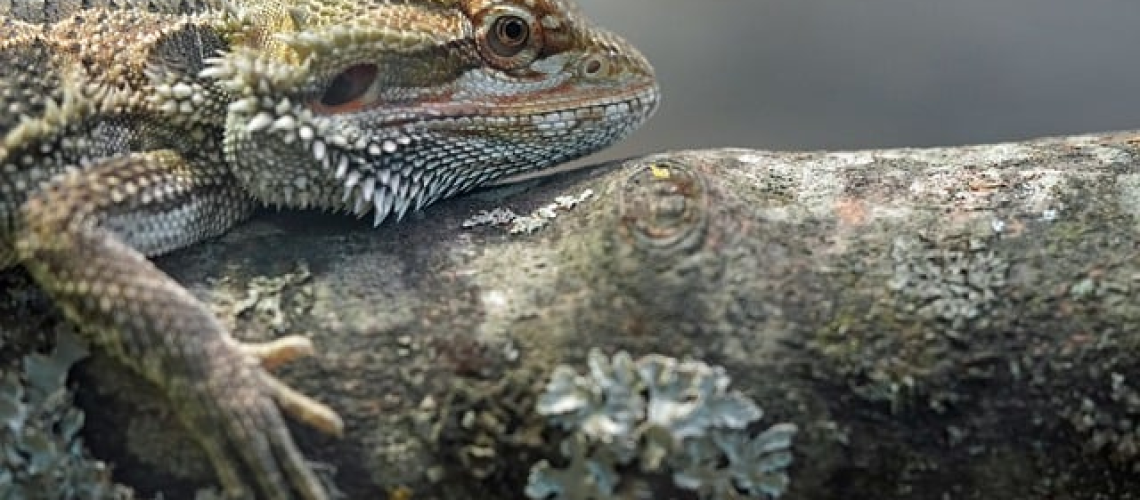Are you the proud owner of a bearded dragon? Taking proper care of your pet is essential for their health and wellbeing. This article provides helpful tips and considerations to ensure that your scaly friend receives the best possible care.
Learn more about proper diet, signs of illness, hygiene, vaccinations, stress management, and environmental enrichment for your beloved lizard.
Key Takeaways
- A balanced diet is essential for a bearded dragon’s health.
- Regular vet visits for vaccinations are essential.
- Regular bathing rituals are important for hygiene.
- Provide environmental enrichment for a happy and healthy pet.
Proper Diet and Nutrition
A balanced diet is key to a bearded dragon’s health. They should be fed a variety of proteins, vegetables, and fruits.
Heat requirements must also be taken into account, as it affects digestion and metabolism.
Calcium deficiency can cause serious health issues, so make sure to include calcium-rich foods in the diet.
Feeding your beardie the right food at the right times is essential for its wellbeing.
Variety and moderation are key – provide an array of nutrient-packed treats for them to enjoy!
Signs of Illness and Injury
If you notice any changes in your pet’s behavior or physical appearance, it may be a sign of illness or injury.
Monitor for the following:
-
Behavioral Changes: Lethargy, appetite loss, aggression.
-
Physical Symptoms: Skin discolorations, wounds, swollen areas.
Recognizing symptoms early can help ensure your bearded dragon receives proper care and treatment.
Be vigilant in monitoring their behavior and act quickly if something appears amiss.
Grooming and Hygiene
Grooming and hygiene are important for keeping your pet happy and healthy. Bathing rituals should be done regularly while shedding management should be completed when needed. Ensure you use safe, effective, reptile-friendly products to avoid skin irritation.
Use a soft brush or sponge to help remove dirt as well as loose skin during bathing time. Establishing good grooming habits will set your bearded dragon up for a long, healthy life!
Vaccinations and Parasite Control
Regularly scheduling visits to the vet for vaccinations and parasite control is essential for keeping your pet safe from any potential health risks.
-
Vaccines: Ensure vaccine effectiveness with routine booster shots. Research vaccine components and recommended frequency of administration.
-
Parasite Control: Combat parasite resistance with preventative medication. Regular fecal exams to check for parasites in your pet’s system.
Stress Management and Environmental Enrichment
Providing your pet with environmental enrichment and managing their stress levels is key to keeping them happy and healthy.
Activity levels should be monitored, as too little or too much can both lead to boredom or fatigue.
Ensure a suitable cage size for the beardie’s needs, giving them plenty of space to move around and explore.
Provide novel items like branches, rocks, and hides for mental stimulation while encouraging daily exercise to keep your dragon content.
Frequently Asked Questions
What Is the Best Type of Enclosure for a Bearded Dragon?
For your bearded dragon, an enclosure size of at least 40 gallons and a proper lighting setup are key. Provide plenty of space to climb, hide, and bask in the sunlight. Offer UVB bulbs and/or fluorescent tubes for added warmth and nutrient absorption. Give them freedom to roam while keeping them safe!
What Is the Ideal Temperature and Humidity for a Bearded Dragon?
The ideal temperature for a bearded dragon is between 78-88°F, with the basking spot reaching 95-100°F. To regulate humidity levels, keep it between 30-40%. Maintain these conditions to ensure your pet’s health and comfort!
What Is the Average Lifespan of a Bearded Dragon?
The average lifespan of a bearded dragon is 8-10 years with proper nutrition and regular check ups. Take care of your dragon to ensure it enjoys a long, happy life!
What Should I Feed My Bearded Dragon?
Feed your bearded dragon a balanced diet of fresh vegetables, leafy greens, insects and occasional fruits for gut health and vitamin balance. Make sure to research appropriate portions and food types to ensure your dragon’s health.
What Should I Do if My Bearded Dragon Is Not Eating?
If your bearded dragon isn’t eating, try dietary modifications and regulating its temperature. Talk to a vet for advice on how to adjust their diet or environment as needed.
Conclusion
Taking care of your bearded dragon’s health is essential to its wellbeing. By following these tips, you’ll be able to provide the best possible veterinary care for your pet.
- Make sure you feed them the right diet and nutrition.
- Watch out for signs of illness or injury.
- Keep their environment clean and hygienic.
- Ensure they’re vaccinated and parasite-free.
- Give them plenty of stress-relieving activities.
Invest in your dragon’s health today – it’ll pay off in the long run!






